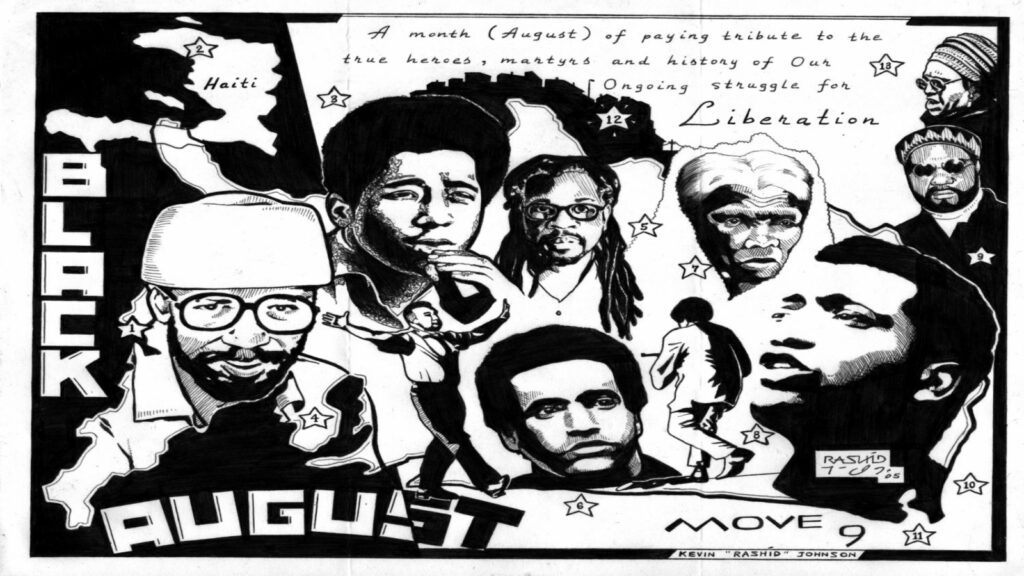
What is Black August? Black August honors Black freedom fighters and political prisoners, spotlighting resistance to racial oppression, celebrated all August.
First established in 1979 by the Black Liberation Organization, Black August has since become an important period of remembrance in the African American community. In many ways, Black August mirrors Black History Month, with a focus on honoring those who have sacrificed for the advancement of civil rights. In this article, we’ll explore the origins and principles of Black August, discuss how it differs from Black History Month, and highlight some of the most significant events that have occurred in Black history during August.
What is Black August?
Black August is an annual commemoration and celebration of the rich and complex history of the Black community. It is a time to reflect on the struggles, sacrifices, and achievements of Black people throughout history, as well as to honor those who have dedicated their lives to the struggle for racial justice and equality.
To understand the significance of Black August, it is important to explore the origins of this observance. Black August was first established in the 1970s by incarcerated Black activists who were fighting against systemic racism and oppression in the United States. These activists wanted to create a month-long tribute to the Black freedom fighters who had come before them, and to draw attention to the ongoing struggle for Black liberation.
Today, Black August is celebrated in various forms by communities and organizations across the United States and around the world. It is a time to reflect on the rich history of the Black community, and to celebrate the strength, resilience, and creativity of Black people in the face of ongoing challenges and struggles.
Some key Black August facts include the fact that it is often marked by fasting and other acts of self-discipline, as well as by community events, educational programming, and artistic expression. It is also closely linked to the principles of Black nationalism, pan-Africanism, and anti-colonialism, and it often emphasizes the importance of solidarity and mutual aid within the Black community.
Comparing Black August and Black History Month
While Black August and Black History Month both honor the legacy and contributions of Black people, they have distinct differences. Black History Month, observed in February, is a national recognition of the accomplishments of Black Americans throughout history. It celebrates notable figures, such as Martin Luther King Jr. and Harriet Tubman, and acknowledges significant moments, such as the Emancipation Proclamation and the Civil Rights Act.
Black August, on the other hand, is a commemoration of the Black struggle for justice and liberation. It is rooted in the history of the Black Panther Party and its founder, George Jackson, who was killed in a prison uprising in August 1971. Black August also honors the contributions of other Black revolutionaries who fought against oppression and injustice.
While Black History Month tends to focus on achievements and progress, Black August is more reflective and solemn. It is a time for remembrance and resistance, where the focus is on acknowledging the ongoing struggle for Black liberation. Black August recognizes that the fight for justice and equality is ongoing and that the struggle for freedom must continue.
Understanding the differences between Black August and Black History Month can help to appreciate the unique significance of each observance. While Black History Month celebrates the achievements of notable Black figures throughout history, Black August recognizes the ongoing struggle for justice and the contributions of revolutionaries who fought against oppression. What is the origins of Black August and Black August facts will be discussed in more detail later in this article.
The Principles of Black August
Black August is a month-long observance that is steeped in principles that are meant to honor and pay tribute to the resilience, strength, and perseverance of the black community. These principles are deeply rooted in the history of the black struggle, and are designed to commemorate those who fought and continue to fight for justice, equality, and freedom.
Some of the key principles of Black August include the promotion of education, self-reflection, self-determination, and community service. The month is also marked by a commitment to remembering and honoring the sacrifices and struggles of those who have gone before, as well as the ongoing struggles faced by the black community.
One of the unique features of Black August is that it incorporates fasting and abstaining from certain activities as a way to commemorate the sacrifices of political prisoners and freedom fighters who have been incarcerated or have lost their lives in the struggle for freedom. This tradition dates back to the origins of Black August, which was founded as a way to honor and remember the heroic struggles of political prisoners in California during the 1970s.
Overall, the principles of Black August are rooted in a deep respect and reverence for the history and contributions of the black community. It is a month that is marked by both celebration and reflection, and it serves as an important reminder of the ongoing struggle for justice, equality, and freedom.
The Origins of Black August
The Origins of Black August are rooted in the struggle for Black liberation. It was first recognized as a commemorative month in the 1970s by political prisoners in California. The month was chosen because of the significance of several events in August that have shaped the history of Black people. One of these events was the birth of Marcus Garvey, a Jamaican-born political activist who inspired Black pride and nationalism.
Another event was the rebellion at San Quentin Prison, which saw a group of Black prisoners protesting against the inhumane treatment they were receiving.
Black August Facts reveal that the month is also observed as a time to honor fallen Black freedom fighters, including George Jackson, who was killed in San Quentin during the rebellion. Jackson was a political prisoner who became an influential leader of the Black Panther Party while in prison. The month is also dedicated to remembering the Haitian Revolution, which ended slavery on the island and inspired the fight for liberation in the United States.
Black August is more than just a commemorative month. It is a call to action for Black people to resist oppression and fight for liberation. Its principles emphasize unity, education, self-discipline, and sacrifice. By observing Black August, we honor the legacy of those who have fought and died for our freedom, and we renew our commitment to continue the struggle.
Significant Events in Black History in August
August has been a month of significant events in Black history, making it all the more meaningful to celebrate Black August. From the Haitian Revolution to the March on Washington, here are some key moments to remember:
– Haitian Revolution: On August 22, 1791, the Haitian Revolution began with a slave uprising in the French colony of Saint-Domingue, eventually leading to the creation of the first Black republic.
– March on Washington: On August 28, 1963, civil rights leaders gathered for the March on Washington for Jobs and Freedom, where Martin Luther King Jr. delivered his iconic “I Have a Dream” speech.
– Watts’s Riots: On August 12, 1965, in Los Angeles, California
– Assassination of George Jackson: On August 21, 1971, during a prison riot at San Quentin. Mrs. Georgia Jackson, the mother of George Jackson, said that her son had been murdered inside the Adjustment Center, and his body dragged outside by guards.
– The death of San Quentin prisoner Khatari Gaulden: On August 1, 1978, Khatari Gaulden, was left to die, as a result of medical neglect by San Quentin Prison authorities.
– Black August started in 1979: Instead of adding Aug. 1 (Gaulden’s death), to the existing days of observation that marked the deaths of activists like W.L. Nolen, Alvin Miller, Cleveland Edwards, and George and Jonathan Jackson, the prisoners standing in resistance to the massive California prison-industrial complex declared the whole month to be Black August.
– Hurricane Katrina: On August 29, 2005, Hurricane Katrina made landfall in Louisiana, causing devastating damage and disproportionately affecting Black communities.
– Shooting death of Michael Brown: On August 9, 2014, unarmed Black teen Michael Brown was shot to death by a Ferguson, Missouri, police officer. Brown’s body was left on the summer pavement for 4 hours, and sparked the international outcry, “Hands Up! Don’t Shoot!”
– Fatal plot against Hugo “Yogi” Pinell: On August 12, 2015, Soledad Six member, aka Soledad Brothers’ member, Hugo “Yogi” Pinell was shanked to death by white prisoners after being released from solitary confinement, as a result of a federal court order ending the practice of long-term solitary confinement in the California prison system.
These are just a few examples of the significant events in Black history that have taken place in August. By understanding the origins of Black August and its principles, we can continue to honor and remember the struggles and achievements of the Black community throughout history.
Conclusion
In conclusion, Black August is a month-long observance of significant events and figures in Black history. Its principles are centered on the resistance and resilience of Black people against systemic oppression and injustice. When compared to Black History Month, Black August has a more focused and militant approach, with emphasis on self-reflection and activism.
The origins of Black August can be traced back to the California prison system, where political prisoners sought to commemorate and honor fallen comrades while also promoting resistance and political education. Over time, Black August has spread beyond prison walls and is now recognized and celebrated by various Black communities around the world.
As we reflect on the significant events and figures in Black history during the month of August, we are reminded of the ongoing struggle for justice and equality. From the Haitian Revolution to the March on Washington, Black history in August is filled with moments of courage and resilience that continue to inspire and empower generations of Black people today.
As we continue to celebrate Black August, let us remember the principles that guide this observance and commit ourselves to the fight for freedom and justice for all Black people. What is the origins of Black August may have started as a way to honor those who have come before us, but it is now an important reminder that our fight is not over and that our voices matter.
